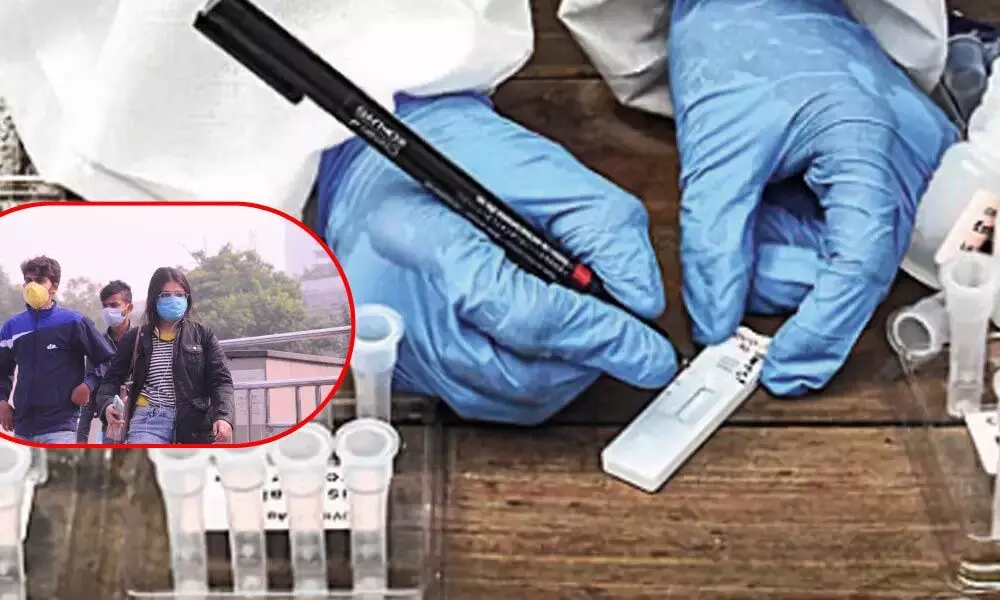Covid variant causing 2nd wave in India, majority feel
Maharashtra, the top contributing State now has over 30,000 daily cases which is over 60 per cent of India’s caseload
image for illustrative purpose

From the learnings of handling Covid in 2020 and a massive vaccination drive that has inoculated over 4 crore citizens with approximately 30 lakh getting it each day, India is poised to handle the second wave much better
New Delhi: ALARM bells are ringing as 52 per cent citizens say the risk of Covid-19 variant strains leading to a strong second wave in India is now high, as per a survey by LocalCircles.
Sixty per cent believe that the new coronavirus variants have a role to play in the latest surge.
Many citizens are again planning to observe social distancing and mask protocols, maintain healthier lifestyles, and save more to prepare for a strong second wave.
Covid-19 has put pressure on the mental health of several Indians with 30 per cent experiencing its negative impact and cannot afford a strong and prolonged second wave.
Overall, the findings of this study clearly indicated that with Covid case-loads rising in India and the massive surge experienced in Maharashtra, 52 per cent of citizens in the survey now feel that the risk of a strong second wave driven by coronavirus variants is high.
The silver lining here is that with so many people realising the risk, people are once again willing to take social distancing precautions, wear masks and have healthier lifestyles.
From the learnings of handling Covid in 2020 and a massive vaccination drive that has inoculated over 4 crore citizens with approximately 30 lakh getting it each day, India is poised to handle the second wave much better, LocalCircles said.
The daily Covid caseload in India had crossed the 45,000-mark after several months, which is a 4-fold rise in the last 45 days and a 3 fold rise in the last 30 days. Maharashtra, the top contributing State now has over 30,000 daily cases which is over 60 per cent of India's caseload.
Both the SARS-COV2 variants - the UK variant and South African variant - have been found in India but due to limited genome testing, less than 500 cases of these variants have been identified so far.
The test positivity rate with this so-called second wave of Covid in India is extremely high. Districts like Amravati in Maharashtra, where the South African strain was identified earlier this month, still has a test positivity rate of 12 per cent.
For this reason, there are ongoing conversations to reinforce lockdowns, night curfews, along with the issue of Covid bed non-availability.
LocalCircles has conducted a national survey to understand the perception of people about the risk associated with the strong second wave of Covid in India driven by SARS-COV2 variant.
Sixty per cent citizens believe that the new variants have a role to play in the 3-fold rise in Covid cases in the last 30 days.
This finding is significant even though this wave has only been observed in Maharashtra.
Scientists studying variants of coronavirus mutation suggest that we need to continue doing what we were doing-wearing a mask, maintaining physical distance, and practicing hand hygiene-to prevent ourselves from getting infected. They also suggest that human behaviour is important to drastically reduce the chances of getting infected.
To understand citizens' preparedness, the survey findings indicated that the majority of citizens plan to observe social distancing and follow mask protocols. Also, 69 per cent said they plan to eat healthily and exercise regularly to be better prepared for Covid variants, and thus minimise the impact.
To prepare against the new B.1.1.7 coronavirus variant, most people plan to save more and keep liquid funds available for medical expenses.
Many migrant labourers, out of work went back to their native places with literally no earnings for six to nine months. It was only in September 2020, that the economic situation started to recover and many who had no savings learned about the importance of it the hard way.
Similarly, many who were impacted by Covid and needed hospitalisation without insurance coverage realised its importance.
With case-loads rising once again, the survey sought citizens' preparedness on their financial front to avert any untoward situation if the new strains of coronavirus spread rapidly. The result of the poll indicated that most citizens plan to save more and keep liquid funds available for medical expenses.
The rising case-loads are likely to have bearing on the spending as the focus of consumers like in 2020 will move from discretionary purchases of products and services to essentials.
The survey found that 12 months into the Covid-19 pandemic, 15 per cent citizens feel anxious or worried, while 11 per cent are feeling depressed or gloomy.
The last 12 months have been a difficult period for many families who lost their dear ones due to Covid, or one of the members got hospitalised with others in the family trying to arrange tests, beds, and taking care of them.


